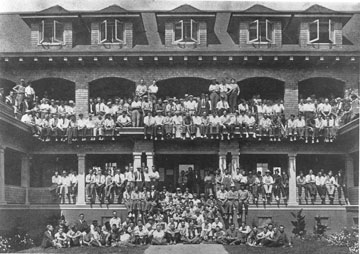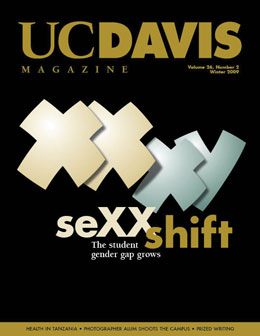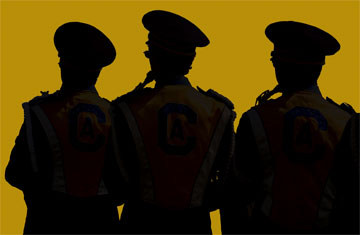Volume 26 · Number 3 · Spring 2009
Letters

West Hall
West Hall
It was interesting to me to see the Centennial issue, which featured West Hall. I went to UC Davis in fall 1953 and spent my first couple weeks staying in West Hall just before they demolished it. I was at the time interested in getting into one of the fraternities so the school had me stay in West Hall for the duration of the rushing weeks. I did join the AGR fraternity, which was a great choice for me. So I thought you might be interested in hearing from the last occupant of West Hall. I was there by myself for that short period. I still have the fondest memories of my time at UC Davis and have counseled several students to go there since. I work now as the director of the International Leadership Consortium, which has seven graduate schools in Africa, the Middle East and Asia. Blessings to all of you at the magazine as I enjoy reading it.
Roy Rosedale ’55
A Coed First
Thanks for sharing “All in the Family” in the winter 2009 issue. The article about the Wilson family noted that Darrell and Barbara Wilson met in Malcolm Hall, “the first coed dormitory at UC Davis.” I recall that in 1960 Titus Hall, which no longer exists, was considered the first coed dormitory. Of course, coed then was a much more conservative concept than now.
Titus had been a women’s dorm. It was U-shaped with two dormitory wings and the main entrance, common area and dining hall at the center of the U. In fall 1960 it became coed when men were housed in the south wing and women in the north wing. It was considered coed because male and female students shared the common area, hallways leading to the dorm rooms and the dining hall. Other halls, like Beckett for men and Hughes for women, had separate common and dining areas.
I was a resident assistant in Titus that year and remember well meeting with the dean of students and discussing concerns about this “radical” concept. How times have changed.
All in the Family
As an alumnus and now retired UC Davis professor, I have enjoyed many editions of UC Davis Magazine. The recent winter 2009 edition was especially interesting and appealing in its written and pictorial composite. Of the several articles that I enjoyed, “All in the Family” by Elizabeth Stitt was especially pertinent for me since Wes Hackett has been a respected colleague for many years and George (Tim) Wilson and I came from the Delta together as friends and freshmen in 1947.
’51
Professor emeritus
'SeXX Shift' Stererotypes

(Karin Higgins/UC Davis)
As an alumna, I was disappointed and even angered by your [winter ’09] article “Sexx Shift,” which presents the female majority on campus as a problem that we should “worry about.” To reach its conclusion that a female majority is a worrisome “divide,” the article grossly stereotypes male and female students (men are “physically active” and women “argue about “room décor and borrowing clothes”). Worse, the article suppresses key evidence and draws questionable generalizations from the evidence it does provide. According to the National Bureau of Labor Statistics, women with college educations make about the same amount of money as men with high-school educations. Not only is this evidence of a wage gap — women’s work is, in the majority of cases, undervalued compared to men’s work — but it might help explain why fewer men go to college. College is expensive, time-consuming, and challenging, so why attend if you can make good money as a plumber or construction worker instead of spending four years to become a social worker or teacher? . . . Why is the success of female students — including the remarkable achievements of African-American and Latina students — presented in the article as a problem, and schooling itself blamed as “tough for boys”? Perhaps, instead of criticizing schools and teachers, boys should be striving to emulate girls’ strategies for success. Instead of saying the system is flawed because boys do poorly, why not focus on what girls and women are doing right?
. . . I look forward to an article in UC Davis Magazine that does a lot more critical thinking on this subject — and that congratulates female students and alumnae for our persistence and achievements in spite of the fact that people are still seeing us as a “problem.”
Lisa Jadwin ’81
Professor of English
St. John Fisher College
Rochester, NY
So a millennium of suppression of women’s talents at universities is beginning to be undone, and you’re worried? I’m glad to read about the change. Read your article carefully — women in engineering still need to overcome barriers. When those barriers are lessened and women engineers dominate in numbers, you can worry.
Carolyn Primus, Ph.D. ’80
Band Behavior
I just wanted to say thank you for writing a rather impartial piece about the allegations of inappropriate behavior in the Aggie Band in [winter 2009] “Allegations Prompt Review of Band.” Other pieces I’ve seen from Bay Area and Sacramento news sources have not been as conscientious about prioritizing news over editorial comment. Still, I think including some interview material from a band member would have helped give readers complete perspective about the allegations by Mr. Slabaugh and the comments provided by Student Affairs Vice Chancellor Fred Wood.
I’d also like to note that in addition to that article, that edition of the magazine pictured the band three times (“An Anniversary Visit” page 21, “UC Day” page 34, “A Festive Fall” page 35) and recognized Tracy Finlayson ’00 (page 35), an Aggie Band alum, for winning the 2008 Jay S. Drotman Memorial Award. UC Davis Magazine has had pictures or pieces about the band in the past, but I can’t recall a previous issue with so many instances. Thank you for recognizing the band’s efforts toward supporting athletic teams and campus events as well as their member’s postgraduate accomplishments. Life would not be the same without the Band-uh!
Robert Robb ’04
Drum Major ’04

I suspect that excellence in a band, excellence in athletics and excellence in academics have something in common. At some point a band member, an athlete or a scholar realizes that the real fun comes through excellence, and that excellence comes through disciplined, hard work for the sake of something greater than oneself. I fail to see evidence of two things in your article “Allegations Prompt Review of Band.” The first is any suggestion on the band’s part of the total discipline that excellence in musicianship (or anything, for that matter) requires. A football team that posts a banner out its bus window saying “I Boobs” could not be said to be focusing on the game, and the same could be said of a band heading to a performance. Such behavior would be taking for granted the game or the music, and excellence in either. One suspects that the UC Davis band is and will be a second-rate version of Animal House until it commits itself fully to excellence in musicianship.
Second, the article also states that the university “takes these issues seriously.” One hardly believes this to be true. Such behavior doesn’t come out of nowhere and spring suddenly to life. Sexual harassment, like racism, operates in an environment of tolerance and/or willful denial. I’ll believe that the university is serious when there are, as reported by the Chronicle, no condoms hanging in the band practice room, no young people showing up for practice drunk and the band wins an award for performance excellence. Right now, its total performance is lacking and suggests that someone who cares about music and the university needs to stand up to the bullies in the band.
Gene Laskowski ’67
Tibetan taboo
I enjoy reading your magazine and finding out what is going on in the UC Davis community. I was surprised, however, when I turned to the back cover [winter ’09 issue] to see a photo of a Davis alum standing next to a prayer wheel in Tibet, mugging for the camera and touching the wheel with her left hand. This is taboo in Tibet, Nepal and China, where the left hand is considered polluted and the right hand is reserved for eating and touching holy things such as a prayer wheel. I hope that the alumni association teaches what is culturally appropriate on their tours and would know better than to use this photo as an advertisement.
Brooke Barnhart ’01
